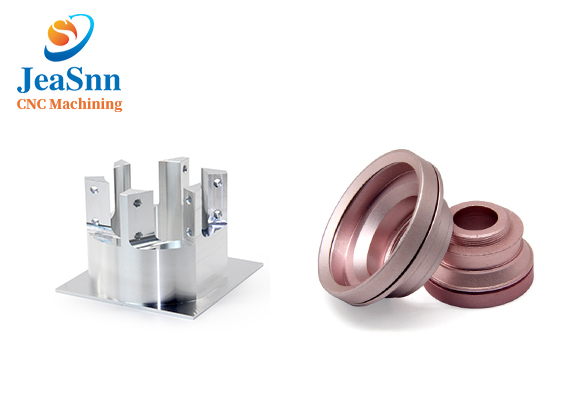precision machined aluminum parts are aluminum parts manufactured through high-precision machining processes. Mainly used in automobiles, aerospace, medical equipment, engineering machinery and other Industries.

The manufacturing process of precision machined aluminum parts mainly includes the following steps:
Raw Material preparation: Select high-quality aluminum alloy materials, such as 6061, 6082, etc. These materials have good mechanical properties, corrosion resistance and machinability, and are suitable for manufacturing precision parts.
Pretreatment: Before processing, the raw materials are pretreated, such as cutting, deburring, cleaning, etc., to ensure the smooth progress of the processing process.
Machining: High-precision CNC Machine tools (CNC) are used for processing. CNC processing can achieve complex shapes and precise dimensional control, and is an ideal choice for manufacturing precision parts. The processing process may include milling, turning, drilling, tapping and other processes.
Surface treatment: According to application requirements, the processed parts are surface treated, such as anodizing, sandblasting, polishing, etc. These treatments can improve the corrosion resistance, aesthetics and wear resistance of the parts.
Inspection and quality control: Comprehensive inspection of the processed parts, including dimensional measurement, shape inspection, surface quality assessment, etc. At the same time, the quality control process ensures that each part meets the design requirements.
Precision machined aluminum parts usually use high-quality aluminum alloy materials, such as 6061, 6082, etc. These materials have the following advantages:
Good mechanical properties: Aluminum alloys have high strength and toughness and can withstand certain loads and impacts.
Good corrosion resistance: A dense oxide film is easily formed on the surface of aluminum alloys, which has good corrosion resistance.
Strong machinability: Aluminum alloys are easy to cut and process, and can meet the requirements of various complex shapes and sizes.
Low density and light weight: The density of aluminum alloys is low, and the parts made are light, which is conducive to reducing the overall weight and energy consumption of the equipment.
The thickness and precision of precision machined aluminum parts depend on the specific application needs and design requirements. Generally speaking, the thickness range of parts is wide and can be adjusted as needed. In terms of precision, very strict requirements are required to ensure that the parts can meet the design requirements during assembly and use.
Thickness: The thickness of the part depends on its application scenario and stress conditions. For example, in the automotive industry, some structural parts may require thicker aluminum alloy plates to increase strength and rigidity; while in electronic devices, thinner aluminum alloy plates may be used to reduce weight and reduce costs.
Accuracy: The accuracy requirements of precision machined aluminum parts are very high. Generally speaking, the dimensional accuracy can reach ±0.02mm or even higher; the shape and position accuracy also need to be strictly controlled to ensure that the parts can be accurately matched during assembly.
Finished product inspection of precision machined aluminum parts is a key step to ensure their quality. The inspection content mainly includes dimensional measurement, shape inspection, surface quality evaluation, and material performance testing.
Dimension measurement: Use high-precision measuring tools (such as vernier calipers, micrometers, three-coordinate measuring machines, etc.) to measure the dimensions of the parts to ensure that they meet the design requirements.
Shape inspection: Check the shape of the parts by visual inspection or using optical measuring instruments to ensure that there are no problems such as deformation or distortion.
Surface quality evaluation: Check whether the surface of the part is flat and smooth, and whether there are defects such as scratches and cracks. At the same time, the quality of surface treatments such as anodizing also needs to be evaluated.
Material performance testing: Material performance testing of parts, such as hardness testing, tensile testing, etc., is performed to ensure that they meet the design requirements and the requirements of the use environment.
In practical applications, more advanced detection technologies, such as 3D scanning technology, may also be required to conduct comprehensive inspection and analysis of parts. This technology can quickly and accurately obtain 3D data of parts, including size, shape and surface features, etc., to provide strong support for quality control and product design.
Precision machined aluminum parts are widely used in various fields. Here are some specific application cases:
Automotive industry: Aluminum alloys are widely used in the automotive industry, such as key components such as engine blocks, wheels, and suspension systems. These components need to withstand large loads and impacts, so the materials are required to have good mechanical properties and machinability.
Aerospace: Aluminum alloys also play an important role in the aerospace field. For example, aircraft shells, wings and other components are usually made of aluminum alloys to reduce weight and improve flight efficiency.
Medical equipment: In medical equipment, aluminum alloys are used to manufacture surgical instruments, medical bed frames and other components. These components require good corrosion resistance and machinability to ensure the reliability and safety of the equipment.
Engineering machinery: Aluminum alloys are used in engineering machinery to manufacture various structural parts and transmission parts, such as the booms and transmission shafts of excavators, loaders and other equipment. These parts need to withstand large loads and vibrations, so the materials are required to have high strength and toughness.
Electronic products: Aluminum alloys are mainly used to manufacture housings, radiators and other parts in electronic products. These parts are required to have good heat dissipation performance and aesthetics to meet the user's experience and aesthetic needs for the product.
Precision machined aluminum parts are a high-performance, high-quality component that is widely used in various industries. By adopting advanced processing technology and testing technology, it can be ensured that these parts meet the design requirements and the requirements of the use environment, providing strong support for the performance improvement and reliability of various equipment. Welcome to contact JeaSnn, each precision machined aluminum parts is strictly produced to ensure compliance with international standards.





 English
English

